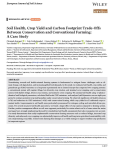Rosinger C., Gotthalmseder G., Bodner G., Keiblinger K.M., Forstner S.J., Sanden T., Ferretti G., Prebibaj M., Neugschwandtner R.W., Kaul H. (2025). Soil health, crop yield and carbon footprint trade-offs between conservation and conventional farming: a case study. European Journal of Soil Science, 01/09/2025, vol. 76, n. 5, p. e70194.
https://doi.org/10.1111/ejss.70194
https://doi.org/10.1111/ejss.70194
| Titre : | Soil health, crop yield and carbon footprint trade-offs between conservation and conventional farming: a case study (2025) |
| Auteurs : | C. Rosinger ; G. Gotthalmseder ; G. Bodner ; K.M. Keiblinger ; S.J. Forstner ; T. Sanden ; G. Ferretti ; M. Prebibaj ; R.W. Neugschwandtner ; H. Kaul |
| Type de document : | Article |
| Dans : | European Journal of Soil Science (vol. 76, n. 5, September-October 2025) |
| Article en page(s) : | p. e70194 |
| Langues : | Anglais |
| Langues du résumé : | Anglais |
| Catégories : |
Catégories principales 06 - AGRICULTURE. FORÊTS. PÊCHES ; 6.4 - Production Agricole. Système de ProductionThésaurus IAMM SYSTEME DE PRODUCTION ; AGRICULTURE DE CONSERVATION ; AGRICULTURE INTENSIVE ; GESTION DU SOL ; RENDEMENT DES CULTURES ; EMPREINTE ECOLOGIQUE ; BILAN CARBONE ; ETUDE DE CAS ; EUROPE |
| Résumé : | Transitioning towards soil health-oriented farming systems is fundamental to mitigate future challenges such as climate change, soil degradation, and increasing global food demands. In this study, we evaluated soil health, crop yields, and greenhouse gas (GHG) emissions at a long-term experimental site in Central Europe that comprised two cropping systems: a conventional system with regular tillage, low-diversity crop rotation, and minimal cover cropping, and a conservation system with shallow tillage, diverse crop rotation, and extensive cover cropping. We assessed soil health using 13 physico-chemical and biological parameters, calculated field-scale GHG emissions, and analysed yield dynamics over an eight-year period to evaluate potential crop yield penalties under conservation farming. We observed significant soil health advances (+7%) and reductions in GHG emissions (-43%) with conservation farming, while crop yields for all cultivated crops remained stable. Improvements in soil health were particularly pronounced for nitrogen cycling and microbial-driven processes. For several measured soil health parameters, we found a larger effect of crop species compared to farming system. Further, positive management effects on soil were apparent particularly for winter wheat and to a lesser extent for maize and sugar beet, strongly emphasizing the need for standardized soil health assessments that take crop species into account. Our study demonstrates that easily implementable conservation farming measures such as reduced tillage, increased crop diversity, and enhanced cover cropping can substantially improve soil health and long-term agricultural sustainability without compromising crop yields. Conservation farming thus emerges as a viable strategy to support resilient crop production in temperate regions. |
| Cote : | En ligne |
| URL / DOI : | https://doi.org/10.1111/ejss.70194 |







